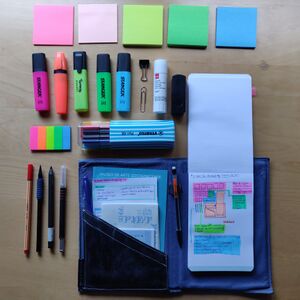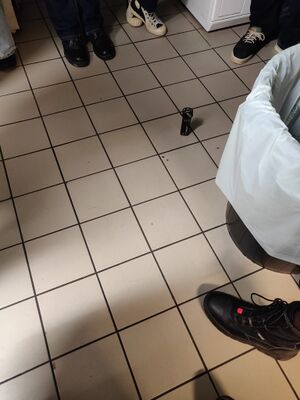User:Thijshijsijsjss/Notes on SI22
This page reports on my explorations, findings, unfindings and (more) during Special Issue 22. In the spirit of the wiki, I will resist my current urge to write this introduction in detail -- because I can't write it in detail, yet.
Week 1
Tour at WORM
Monday 2023 - 09 - 18 we (XPUB1, Michael and Steve) gathered at Worm for a tour led by Lukas Simonis, Ash Kilmartin and Florian Cramer.
I'm still in the process of collecting imagery from the event. If you, reader, have something to contribute, feel free to reach out
Field Recording task
Monday afternoon, we started to discuss the concept post-digital, with the presence of a physical analogy in the form of a cassette player. We went on to take a look at Radio aporee and where tasked with finding a field recording that triggered a memory. This is to be used in the first radio show. My work on this task can be found here:
My field recording explorations
Show
Maria, Victor and Bernadette are this show's Caretakers. They are present in the Radio WORM studio, while the rest of us are gathered around stereo boxes connected to the (previously tellingly broken) digital screen. Communication between Caretakers and the Caretakers' caretakers goes via an Etherpad. This communication is semi-continuous. I notice I am hesitant to write in it.
(Retroactive) playlist
| Time | Data | Content |
|---|---|---|
| 0-25 | 20.6MB | About Radio Aporee |
| 25-27 | 3MB | Chat from Victor, Bernadette |
| 27-53 | 23MB | Collective Audio Field Recording |
| 53- 57 | ~3MB | Studio Field Recording |
| 57 -65 | ~11.5MB | Cassette Tape Recording |
| 65-68 | 1.5MB | Bells |
| 68-70 | 1MB | Victor: making the mixtape |
| 70-77 | 4MB | Riffusion Jingle |
| 77-86 | 8.5MB | Maria Reads a text (might be called 'Snow', might be by 'Ina Blom') |
| 86-98 | ~11MB? | Aporee Mix / Voices / Westminster |
| 98-105 | 6MB | droning windows movie maker music + voices |
| 105-120 | 15MB? | The remainder |
Shownotes discussion
In the afternoon after the show, we had a discussion with the classroom, this show's caretakers, Michael and Joseph. There are some important takeaways (for me):
- We all like the tension between a preprogrammed playlist and improvisation and the mysterious dynamic it creates for the listerner.
- Personally, I was impressed by the cohesion of the show.
- We liked the overlays between music / sounds / voices. There is some balancing here that is important, it is easy to overwhelm the listener.
- One of the highlight's of the show was when the caretaker's used the etherpad as a script. This back-and-forth between the caretakers and the classroom is something to be fleshed out over the coming week(s).
We have chosen new caretakers already. Actually, my first instinct was not to pick them already. It will be interesting to see how this will change the dynamic between programmed and improvisational radio. Something to reflect on next week.
Prototyping
Tuesday afternoon we had our first prototyping session. In it, we set up a Raspberry Pi and create our own personal user profiles on it. Some useful commands we used today:
- Log in to the pi:
ssh thijsoid@145.24.139.16 - Broadcast a message:
wall [message] - Print to the lineprinter:
echo "[message]" > /dev/usb/lp0
Methods
What is annotating? In it's simplest form: shouting at your TV. We spend some time thinking about the way we currently annotate (examining this Protocol). How do I annotate?
- It depends on the origin of the to-be-annotated work and the purpose of my annotation, but the common denominator tends to be the use of color to structure both the work as well as my notes.
- I tend to prefer physical annotation, because it feels like my annotations are more transformative: my digital notes feel separate from the work, but physical notes feel like a transformation of it.
Some nice quotes from / through Steve:
- Notetaking can be an act of generosity.
- Every text creates a reader.
Together with Victor, Bernadette and Rosa, I read the text On the data set's ruins. We spend quite a big portion of the allocated time on creating, adhering to and reflecting on a reading Protocol (see pad). I noticed I felt more at ease during this discussion. I figure it might have to do with the following aspects:
- Me being more familiar with the article's contents, and hence feeling more confident to speak
- The smaller group size being less intimidating to speak up -- and more easily invited to engage.
- In particular, it might be interesting to reflect on whether the presence of our Protocol had an effect on my at-easeness. It might have, in the sense that I did not have to worry about internally deciding when or where to make a comment: I just had to follow the Protocol.
After this group discussion, we met back with the whole class to discuss our findings (on Protocols and subject matter). In this plenary session, I felt more inclined to speak up that earlier that day. Is this me getting used to the implied Protocols of this class?
Miscellaneous Findings
It is now the weekend. If I'm honest, it has been a lot to take in, and I don't think my brain has caught up with processing the changes yet, let alone the contents of our conversations this week. That said, I'm very excited.
It might be useful -- in a way maybe even necessary -- to fix in time my current thoughts on why I am here. I cannot present an exhaustive list (which to me is wonderful, I hope to find new reasons as time goes on), but it includes:
the collaborative process speaks to me
it seems to allow -- encourage, even -- experimentation with and the use of multiple media
I expect xpub's attitude to help me with some paralyzing struggles of self-curation
I was looking forward to the methods class, and really enjoyed it. In particular, the group's still finding its dynamic, and this was showcase during this class. I'm excited to see this dynamic develop and the undoubtedly interesting conversations we're all going to have.
(AAAHH I'm self-curating again. I'm making this section super small because I'm usure what to do with it but have decided that I should do something to combat this paralysis.)
I have detected the presence of certain social insecurities from which I hoped I had moved on. I'm also terribly self-aware of my English, which is a self-fulfilling prophecy for disaster.
I notice I'm using my desk at home differently than before. Instead of being the 'home base' in my room, it has been a place governed by temporality. I don't think it will remain this way. It is the result of me having to get used to this new routine -- this new Protocol.
Week 2
Another Tour at Worm
This Monday we met at WORM again, this time to tour the radio studio and to talk with Lieuwe Zelle. There, Michael tried to copy the contents of a harddrive with material from radio WORM. This caused the system to fail -- presumably due to moving keyboard messing up the setup: a weird post-digitally rooted scenario.
Lieuwe made an offhand mention of the relationship between radio and podcasts that I think was interesting in the light of Phelan's paper The Ontology of Performance: podcast is to radio what a recording (or otherwise documented work) is to performance. I've been a bit nervous for the radio show, and the Phelan paper and this comment comforted me in the idea that such a show is just that: a performance. The act of doing is what's important, and is in many ways not comparable to the other shows we've done, or, for that matter, to any plans you had for the show beforehand.
Senka brought up a good point on authorship rights and informed consent. Interestingly, Lieuwe felt comfortable using the recordings of other shows by argument of implicit consent. I imagine we'll have to be consiously considerate of these concepts when working with the archive.
The conversation -- and the process of copying the harddrive -- was recorded (see image).
Active Archiving and Collaborative Protocols
We talked about active archiving, constant, licensing
Show
For this show, I contributed by being part of the collaborative reading of Barthes's Death of the Author. This show's Caretakers were Anita, Mania and Wang. They decided to surprise us. I was meaning to ask what had prompted this decision, but didn't get to it. If I were to speculate, it was to hide an interactive element. This element was quite well received -- I hope we can expand on the interactive possibilities, maybe even by covering multiple media.
The element of surprise adds a nuanced element to the dynamic between the Caretakers and the Caretakers' caretakers. Michael expressed a worry this might lead to groups trying to 1-up eachother. While I don't think the surprise was necessarily hindering this time, I do agree with this worry. Rosa raised a question on this topic after the show. I expect to continue the group conversation on this next week.
More details can be found in this show's shownotes andthe script.
Prototyping
Naming the server
Setting up the server
Start from the middle
Collaborative Emacs session
Miscellaneous findings
I had a meeting with Manetta and Michael to dicuss some anxiety I am experiencing. This was a comforting meeting.
This week, we created quite a few new protocols. In particular I had in depth involvement with the Collaborative Emacs and A case for chopchop protocols. In making these, and while having some conversations with my classmates about the start of the program and each other's involvement in the group dynamic, I wonder if we should be more rigorous in the creation of 'social protocols', too. We did introduce (at least) one such protocol: voting by show of hands.


